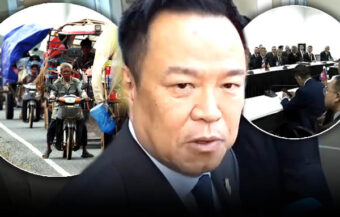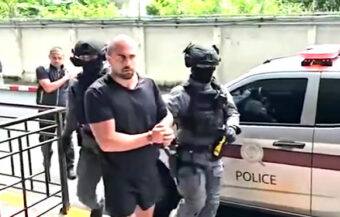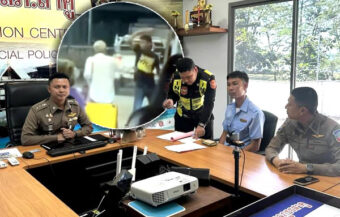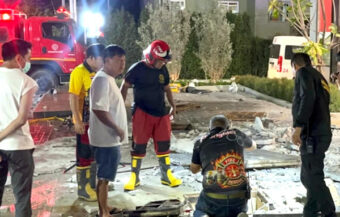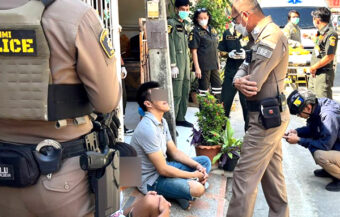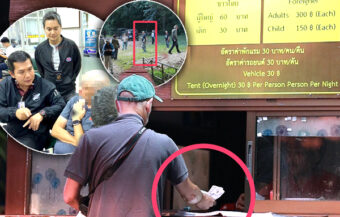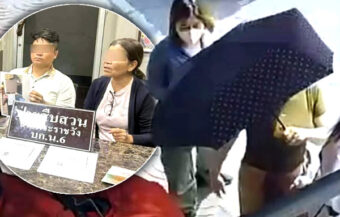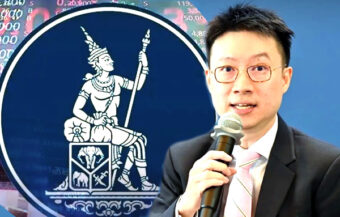The CoronaVac vaccine will be rolled out in Thailand in late February in the first step of the government’s three-step vaccination programme starting with front line medical staff and those at highest risk. Two million doses were purchased by the government from Beijing based Sinovac in a deal inked by the cabinet last week for ฿1.3 billion.
Top Thai virologist Dr Yong Poovorawan has stoutly defended the decision by the Thai government to swiftly deploy the Chinese Sinovac vaccine branded as CoronaVac which is to be rolled out to front line medical staff at the end of February despite what appears to be disappointing efficacy results in a Brazilian study. The top medic explained that the latest data showing a 50.4% efficacy rate compared to an earlier report of 78% was because the trial sample consisted of frontline medical staff in the South American country at higher risk. It has also been confirmed that the subsequently reduced efficacy rate was due to a data subset of very mild infections not requiring clinical intervention, being included later while the vaccine was reported to have had a 100% efficacy rate in the same study for serious infection from the virus.
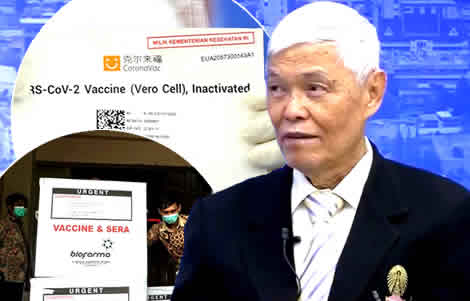
Thailand’s leading virologist has spoken out in defence of plans by the government to vaccinate up to one million frontline health workers and those at highest risk with the Chinese made Sinovac vaccine in late February.
This is despite mixed reports emerging about the vaccine’s efficacy rate. The CoronaVac vaccine was developed by Sinovac in Beijing, one of two leading Chinese firms who have produced an approved Covid-19 vaccine in the communist country.
Disappointing results because of medical staff who are more at risk, used in the Brazilian trial sample
Speaking on the Thailand TV channel, Dr Yong Poovorawan of Chulalongkorn University’s Center of Excellence in Clinical Virology on Tuesday explained that disappointing results confirmed in recent days concerning the Sinovac vaccine were partly related to the type of trial used in the Brazilian study because it involved the vaccination of frontline medical staff in a country which, although among the world’s hardest hit by the disease, still has a high level of scepticism influenced by Brazil’s populist president, Jair Bolsonaro.
The study in Brazil is understood to have used 10,000 medical staff and Dr Yong explained that it would be natural for results among this population to demonstrate higher rates of infection.
He underlined that the critical thing to bear in mind is that the vaccine will save lives when administered in Thailand.
78% suddenly became 50.4% in a Brazilian study
The Butantan Institute, in Sao Paolo, which is the partner in Brazil for the Chinese pharmaceutical firm in rolling out CoronaVac as part of the South American country’s badly needed vaccination programme, last week issued a report suggesting that the CoronaVac vaccine manufactured by Sinovac in Beijing was 78% effective.
This followed a controversially cancelled press conference scheduled to release the results of the trial, at an earlier point, which sparked controversy.
However, it has now clarified that the dataset was incomplete and omitted infections which had been less severe among some of those taking part which did not require any treatment or were what was termed as ‘very mild’.
Later inclusion of this data subset reduced the efficacy rate to 50.4% which is just above the 50% threshold required for approval.
฿1.3 billion deal to purchase 2 million doses of the Chinese vaccine approved by cabinet last week
However, there is also an upside. While the 78% figure for efficacy remains for cases of mild or moderate to severe cases requiring clinical intervention, the efficacy rate for serious cases was 100%.
In Thailand, Dr Yong has defended the decision by the government to purchase 2 million doses of the Sinovac vaccine for ฿1.3 billion saying that the action would save lives.
The deal was negotiated by Public Health Minister Anutin Charnvirakul some weeks ago and approved by the cabinet in the last week.
Would take time to understand the full effects of all the crisis-driven vaccines says top virologist
Dr Yong, this week, also was at pains to point out that he was speaking in his own personal capacity, expressing his own distinct point of view and not on behalf of the government.
The top virologist told the TV audience that Thai health officials should look at getting access to a range of vaccines to test and trial throughout the kingdom as part of their decision making process.
He explained that it would take a long time to understand the full effect of each vaccine developed rapidly to deal with this crisis even though the ones being used had already passed safety and efficacy trials in the last few months.
He particularly emphasised that we do not know how long the immunity conferred by the virus will last. For now, the vaccines developed are a response to a crisis but must be kept under continuous review.
CoronaVac had a 91.25% efficacy rate in Turkey
The CoronaVac vaccine developed by Sinovac has had a wide span of results across the world from a 65% efficacy rate reported in Indonesia to a 91.25% rate reported by a trial in Turkey. The company’s own claimed rate of efficacy is 78%.
This could well be caused by differences in the trial samples and also perhaps in the format of the final report as we have seen in Brazil.
Dr Yong revealed that from a social media survey he undertook with 30,000 respondents, he discovered that the Thai public is overwhelmingly positive about the prospect of taking the vaccine and helping to get the kingdom back to normal but more importantly, to save lives.
Old fashioned inactivated vaccine, not an mRNA type
CoronaVac is what is termed an inactivated vaccine. This is an old and trusted approach to vaccine development. Vaccines such as the Pfizer BioNTtech and Moderna jabs are termed as mRNA vaccines.
The Coronavac vaccine injects particles of killed off virus cells containing its genetic code into the body of those taking the vaccine. This then trains the body’s immune system to respond against the virus.
Associate Professor Luo Daha of Nanyang Technological University, a top Singaporean institution, explained the nature of the vaccine in recent days for the BBC: ‘CoronaVac is a more traditional method of vaccine that is successfully used in many well-known vaccines like rabies’.
Join the Thai News forum, follow Thai Examiner on Facebook here
Receive all our stories as they come out on Telegram here
Follow Thai Examiner here
Further reading:
Gamblers and hosts at illegal gambling dens are being jailed as massive crackdown proceeds apace
Thailand faces its darkest hour against Covid-19 virus as vaccinations due to begin in March
PM criticises employers for using cheap, illegal migrant labour as officials remain on high alert
Thailand mobilising towards faster vaccinations as the Covid virus pandemic reaches new heights
Samut Sakhon flare-up spreads to other provinces but will be brought under control say top officials
Covid 19 outbreak in Samut Sakhon sees province placed under lockdown measures by local officials
Luxury party hotel in Myanmar’s Shan State is the epicentre of Thailand’s current Covid 19 outbreak
Foreigners arriving in Thailand in now increasing numbers targeted by a fake news campaign online
Visa amnesty agreed as emergency decree is linked to the controlled entry of Thais and Foreigners
Homeless people sheltering in closed Pattaya beer bars – Pattaya News report
Mystery Egyptian military flight revealed as exposing Thailand to the Covid 19 virus in Rayong
Agony for stranded western foreigners as ‘Fast-track’ Chinese charter flight jets in from Shanghai
Only 2,000 foreigners have yet registered to be reunited with love ones as tourism to also reopen
Key ministries met on Sunday to discuss access by foreigners to the kingdom and a tourism relaunch
Thai public says No to foreign tourism and also predicts 1 to 2 years for travel to return to normal
Only hope for foreigners locked out of Thailand as easing continues with strict controls on entry
Ministers suggest an easing of the travel ban for some tourists but a continued state of emergency
Thai security chief suggests a full reopening of the kingdom to international flights from July 1st
Australian man’s heartbreak cut off from his Thai wife – begs to be included on repatriation flights

